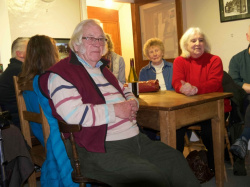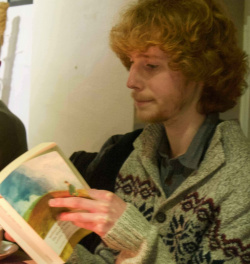Irascible, ill-mannered, worthy but dull? An evening with Wordsworth includes his bad points

“You’ll have to stay another night. The Wordsworth Trust’s running a poetry session in the café tomorrow.” Jane Rousseau – no relation to Jean Jacques – was adamant, even offering to let me stay for free, in my favourite UK café/B&B in the beautiful Duddon valley. Naturally, your reviewer cannot be thus corrupted (I paid my way). Seduced by the prospect of poetry, though? Absolutely.
The flyer made it sound like a cross between a poetry open-mic and a café philosophe: discussions on and the sharing of poetry, in the Square Café overlooking the unspoilt Georgian square of Broughton in Furness. What a wonderful venture, bringing poetry out to the masses. Well, 22 of us, a cracking turnout from a town of 500 souls, eager to hear from the trust’s curator, Jeff Cowton and intern Simon Davies. The only snag being that as the discussion started, I became unclear if this was meant be a Wordsworth evening or a poetry read-around. In fact, it became evident that not everyone felt Wordsworth warranted an evening.
Jeff had scarce finished asking, “what does Wordsworth mean to you?” when he was waylaid by local author Ian Davidson’s question: “Don’t you find Wordsworth boring - worthy but dull?” Warming to his thesis, Ian proffered evidence, before revealing that he had written a paper on his aversion to the poet - 40,000 words’ worth.
What a great start! Although seeming initially taken aback Jeff sensibly allowed the conversation to run as Ian, pictured below, a recent past chairman of the Norman Nicholson Society, was clearly something of an expert himself. Thus we learned, from the erudite exchanges, more about Mr W, and of his sister Dorothy’s and wife Mary’s roles in his success. It seems, from Dorothy’s diary, that the women wrote up the lines that William threw over his shoulder at them, his sister even providing many of the words herself, suggesting that Wordsworth might not have become what he did, boring or not, without her input and support; and, later, that of Mary. There was even a hint that Dorothy provided other services before his marriage, but as I have no tangible evidence for that the jury will please ignore that last remark.

He goes on to reinforce Ian Davidson’s assertions: ““Lines though, not always taut with inspiration/ Not powerful, like his strides, but slowly plodding/ Stumbling to include too much information:/ Over his pages we find that we are nodding.”
However, as if to reinforce my own point at the time, Martin goes on in his final stanza to quote the lines which, for many of us, redeem the great man: “But when, with passion, loud he thunders: ‘Bliss/ was it in that dawn to be alive!’/ Awestruck we wait his words, for surely this/ is the heavenly voice for which all poets strive.”
Indeed. It was a pity that Martin’s contribution couldn’t have immediately followed Ian Davidson’s little discourse, as it would have been a natural opportunity. In fact, that was a slight concern about the evening: its lack of structure, or of clarity about how and when we participants were to, well, participate. Was it expected that we spontaneously read a poem as the mood took us or, as I had assumed, was there to be an open-floor for readings in the second half. Was there, in fact, to be a second half? Clarity about how it was to be structured and what the expectations of the audience/participants would have been helpful. This is not major criticism, just a suggestion for next time, which I hope there is, as did others.
The session was fascinating and valuable, not least in demonstrating that there is a desire for some sort of open-mic poetry event in the area, although you then get the problem of who will organise and run it, and how can you make it worth the venue’s while? Jane is running a café, not a charity and running an open-mic night is more work than it seems. So, well done to Grasmere’s Wordsworth Trust for providing this much-appreciated if eclectic session – part of their outreach programme - free of charge, and for funding the typically splendid food Jane provided for the interval; and for educating me about Wild Will Wordsworth.
The trust is a charity dedicated to preserving Dove Cottage – the Wordsworths’ home before moving to Rydal Mount - and a collection of his works, as well as running courses, exhibitions, readings and other events to bring art and literature alive for tens of thousands annually.

But the feeling is always the same.
It was better the first time.
This time is not nearly as good.
I'm not feeling as chipper as I did back then.
Something is always missing–
swans, a glint on the surface of a lake,
some minor but essential touch.
Or the quality of things has diminished.
And then his, Simon’s, moving description of his “spots of time” project, developed from his work in Bulgaria with Syrian refugees.
Among other readers (apologies to those whose names I didn’t catch), Jean Crosbie recited from her late husband’s pamphlet, Yours Truly, both movingly and rather rudely: “I want you to be my laptop/ sitting on my knees.” It goes downhill from there with talk of floppy disks and hard facts. She might have been safer sticking to the more anodyne words of Wordsworth, or perhaps not: “What was wrong with ordinary intercourse/… A virtue, by which pleasure is enhanced,/ that penetrates, enables us to mount?” Before you dash off to check my sources, I am quoting selectively from the “spots of time” passage of ‘The Prelude’.
The evening was mounted by the Wordsworth Trust in the Square Café, a perfect venue providing a friendly, welcoming ambience, with its eclectic furniture, walls lined by Jane’s artwork and her dad, John Rousseau’s, photographs. Just don’t all go when I want to visit though, as I prefer to “dwell among the untrodden ways”.
Julian Jordon





Greg Freeman
Wed 10th Feb 2016 13:38
Sounds like a very interesting night, Julian! Good on the Wordsworth Trust for taking their show on the road, even if the locals have mixed feelings about "their" poet. It's true that Dorothy's entry in her journal about the daffodils they both saw arguably reads slightly better than the finished product. On the other hand, my father drew great strength from a line in that poem - "that inward eye" - that he had had to learn by heart at school, when he was a prisoner far from home in the second world war. When I was studying Wordsworth at A-level I wrote an essay that was highly critical of 'The Leech Gatherer'. I was told it was well-written - i think the teacher agreed with my sentiments - but that it wouldn't get me many marks in the exam. I kinda lost heart after that.
It should not be forgotten, though, that one of Wordsworth's claims to fame - boring or not - is that he wrote verse in language that was regarded as revolutionary at the time, in that it was simple, and, dare I say it, accessible. Boring some of it might have been - but you could certainly understand it!